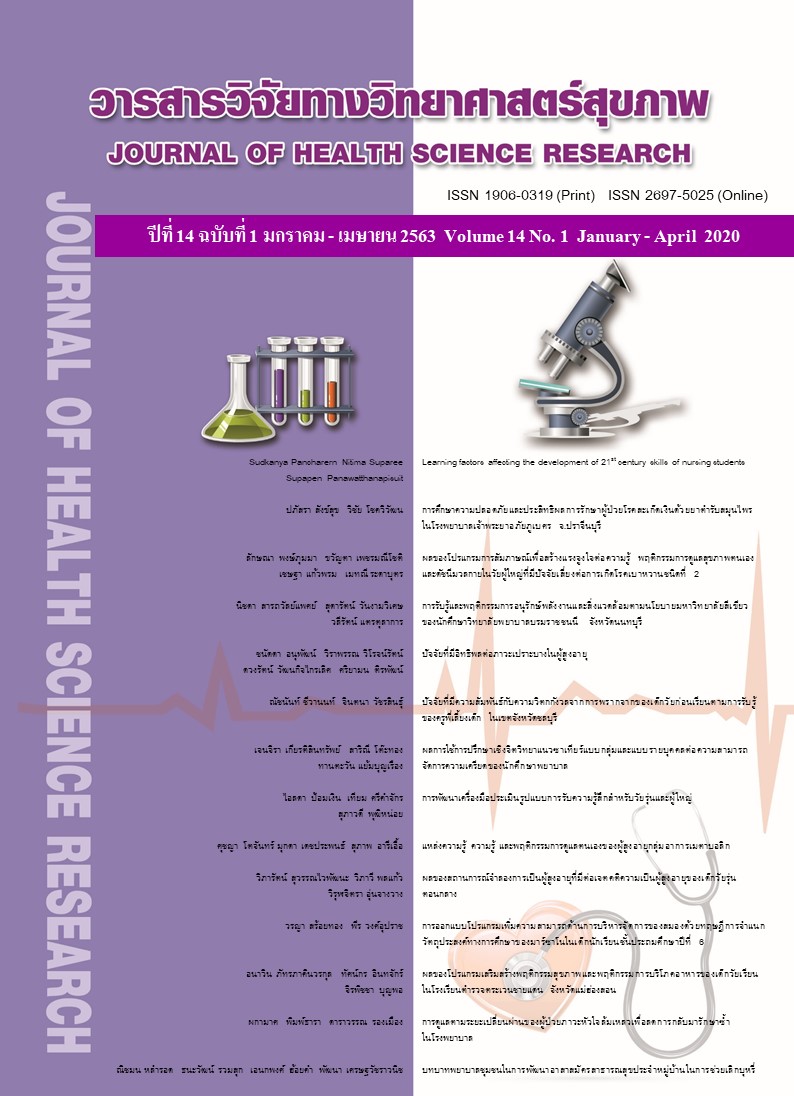แหล่งความรู้ ความรู้ และพฤติกรรมการดูแลตนเองของผู้สูงอายุกลุ่มอาการเมตาบอลิก
Main Article Content
บทคัดย่อ
วัตถุประสงค์การวิจัย: เพื่อศึกษาแหล่งความรู้ ความรู้และพฤติกรรมการดูแลตนเองของผู้สูงอายุกลุ่มอาการเมตาบอลิก และศึกษาความสัมพันธ์ระหว่างเพศกับแหล่งความรู้ ความรู้และพฤติกรรมการดูแลตนเองของผู้สูงอายุกลุ่มอาการเมตาบอลิก
วิธีการวิจัย: การวิจัยเชิงพรรณนา โดยใช้ทฤษฎีการดูแลตนเองของโอเร็มเป็นกรอบแนวคิดในการวิจัย คัดเลือกกลุ่มตัวอย่างตามเกณฑ์ที่กำหนด จากผู้สูงอายุที่มารับบริการจากโรงพยาบาลส่งเสริมสุขภาพตำบลแห่งหนึ่ง ในจังหวัดนนทบุรี จำนวน 95 ราย ระหว่างเดือนตุลาคม พ.ศ. 2561 ถึง มกราคม พ.ศ. 2562 เก็บรวบรวมข้อมูลโดยใช้ แบบบันทึกข้อมูลส่วนบุคคล แบบสอบถามแหล่งความรู้ แบบสอบถามความรู้ และแบบสอบถามพฤติกรรมการดูแลตนเองของผู้สูงอายุกลุ่มอาการเมตาบอลิก วิเคราะห์ข้อมูลด้วยสถิติบรรยายและเปรียบเทียบความแตกต่างด้วยสถิติ แมนน์-วิทนีย์ ยูและไคสแควร์
ผลการวิจัย: แหล่งความรู้ในการดูแลตนเองที่ผู้สูงอายุใช้ในการหาความรู้มากที่สุดคือ บุคลากรทางการแพทย์ กลุ่มตัวอย่างมีความรู้เกี่ยวกับกลุ่มอาการเมตาบอลิกในระดับสูง และมีพฤติกรรมการดูแลตนเองในระดับดี และพบว่าเพศไม่มีความสัมพันธ์กับแหล่งความรู้ ความรู้และพฤติกรรมการดูแลตนเอง
สรุปผล: ผลการวิจัยสามารถนำมาใช้เป็นข้อมูลในการวางแผนการพยาบาลและการจัดกิจกรรมที่เหมาะสมและมีประสิทธิภาพ สอดคล้องกับการเข้าถึงแหล่งความรู้และความรู้ในการดูแลตนเองของผู้สูงอายุกลุ่มอาการเมตาบอลิกต่อไป
Downloads
Article Details
บทความที่ได้รับการตีพิมพ์เป็นลิขสิทธิ์ของวิทยาลัยพยาบาลบรมราชชนนี จังหวัดนนทบุรี
ข้อความที่ปรากฏในบทความแต่ละเรื่องในวารสารวิชาการเล่มนี้เป็นความคิดเห็นส่วนตัวของผู้เขียนแต่ละท่านไม่เกี่ยวข้องกับวิทยาลัยพยาบาลบรมราชชนนี จังหวัดนนทบุรี และคณาจารย์ท่านอื่น ในวิทยาลัยฯ แต่อย่างใด ความรับผิดชอบองค์ประกอบทั้งหมดของบทความแต่ละเรื่องเป็นของผู้เขียนแต่ละท่าน หากมีความผิดพลาดใด ๆ ผู้เขียนแต่ละท่านจะรับผิดชอบบทความของตนเองแต่ผู้เดียว
เอกสารอ้างอิง
Youngwanichsetha S. Metabolic syndrome: Consequences on health, prevention, and management. Songkla Medical Journal. 2015;33(4):207-15. (in Thai).
Foundation of Thai Gerontology Research and Development Institute. Situation of the Thai elderly 2017. Bangkok: Deuan Tula Printing House; 2017. (in Thai).
Aboyade OM, Beauclair R, Mbamalu ON, Puoane TR, Hughes GD. Health-seeking behaviours of older black women living with non-communicable diseases in an urban township in South Africa. Biomed Res Int. 2016;16(410):1-9.
Maneze D, Digiacomo M, Salamonson Y, Descallar J, Davidson PM. Facilitators and barriers to healthseeking behaviors among Filipino migrants: Inductive analysis to inform health promotion. Biomed Res Int.2015;2015.
Rungreangkulkij S, Kittiwatanapaisan W, Kotnara I, Kaewjanta N. Health information seeking behaviors of Thai: A case study in Khon Kaen province. Journal of Nursing Science & Health. 2017;40(1):1-13. (in Thai).
Suriart C, Rutchanagul P, Thongbai W. Health perception, health behavior and health service needs among inmates with metabolic disorders. Ramathibodi Nursing Journal. 2014;20(3):372-87. (in Thai).
Lo SWS, Sek YC, Iris F. Knowledge of metabolic syndrome in Chinese adults: Implications for health education. Health Educ J. 2015;75(5):589-99.
Laloon P, Madhyamankura N, Maiarat A. Self-care behavior of hypertensive patients at out patient department of HRH Princess Maha Chakri Sirindhorn medical center. Journal of Medicine and Health Sciences. 2011;18(3):160-69. (in Thai).
Siangdung S. Self-care behavior of patients with uncontrolled DM. The Southern College Network Journal of Nursing Diabetes Federation. 2017;4(1): 191-204. (in Thai).
Hanucharurnkul S. Orem’s nursing theory in self care: nursing science and arts. 1st ed. Bangkok: Visitsil Ltd; 1991. (in Thai).
Yamane T. Statistic: An introductory analysis. 3rded. New York: Harper and Row; 1973.
Trongsakul S. The prevalence of undiagnosed cognitive impairment and prevalence of undiagnosed depressive mood in over 60’s with type 2 diabetes in a Thai community: A cross-sectional study [Dissertation]. Norwich: University of East Anglia; 2012.
Bunnag A, Nookong A, Sanasuttipun W, Pongsaranunthakul Y, Limparatanagorn P. Metabolic syndrome prevention model for adolescents. Bangkok: Mahidol University; 2014. (in Thai).
Lasutham K, Siripitayakunkit A, Panpakdee O. Factor related to self-care behavior of Thai Buddhist monks with coronary artery disease. Ramathibodi Nursing Journal. 2018; 24(3):313-27. (in Thai).
Al-Maskari F, Mohamed ES, Juma AK, Bacthar A, Nicolas N, Karin BY. Knowledge, attitude and practices of diabetic patients in the United Arab Emirates. Plos One. 2013;8(1):1-8.
Joshi A, Mehta S, Grover A, Talati K, Malhotra B, Perin DM. Knowledge, attitude, and practices of individuals to prevent andmanage metabolic syndrome in an Indian setting. Diabetes Technol The. 2013;15(8): 644-53.
Rattanawarang W. Elderly’s internet used for health information in Bangkok region. Journal of Behavioral Science for Development. 2015;7(1):169-84. (in Thai).
Miller CA. (2019). Nursing for wellness in older adults. 8thed. Philadelphia: Wolters Kluwer; 2019.
Tsou MT. Association of education, health behaviors, concerns, and knowledge with metabolic syndrome among urban elderly in one medical center in Taiwan. Int J Gerontol. 2017;11:138-43.
Hjelm K, Atwine F. Health-care seeking behavior among persons with diabetes in Uganda: an interview study. Biomed Central. 2011;11:1-8.
Kummak S. Self-care behaviors among hypertension patients in Tambon Nanglao health promoting hospital, Amphur Satingpha, Songkhla province. The Southern College Network Journal of Nursing and Public Health. 2016;3(3):153-68. (in Thai).
Pongpumma L, Himananto S. Knowledge and self- care behavior among type 2 diabetes living in Bangsai, Maung, Chonburi, Chonburi province. HCU Journal of Health Science. 2017;20(40):67-76.


